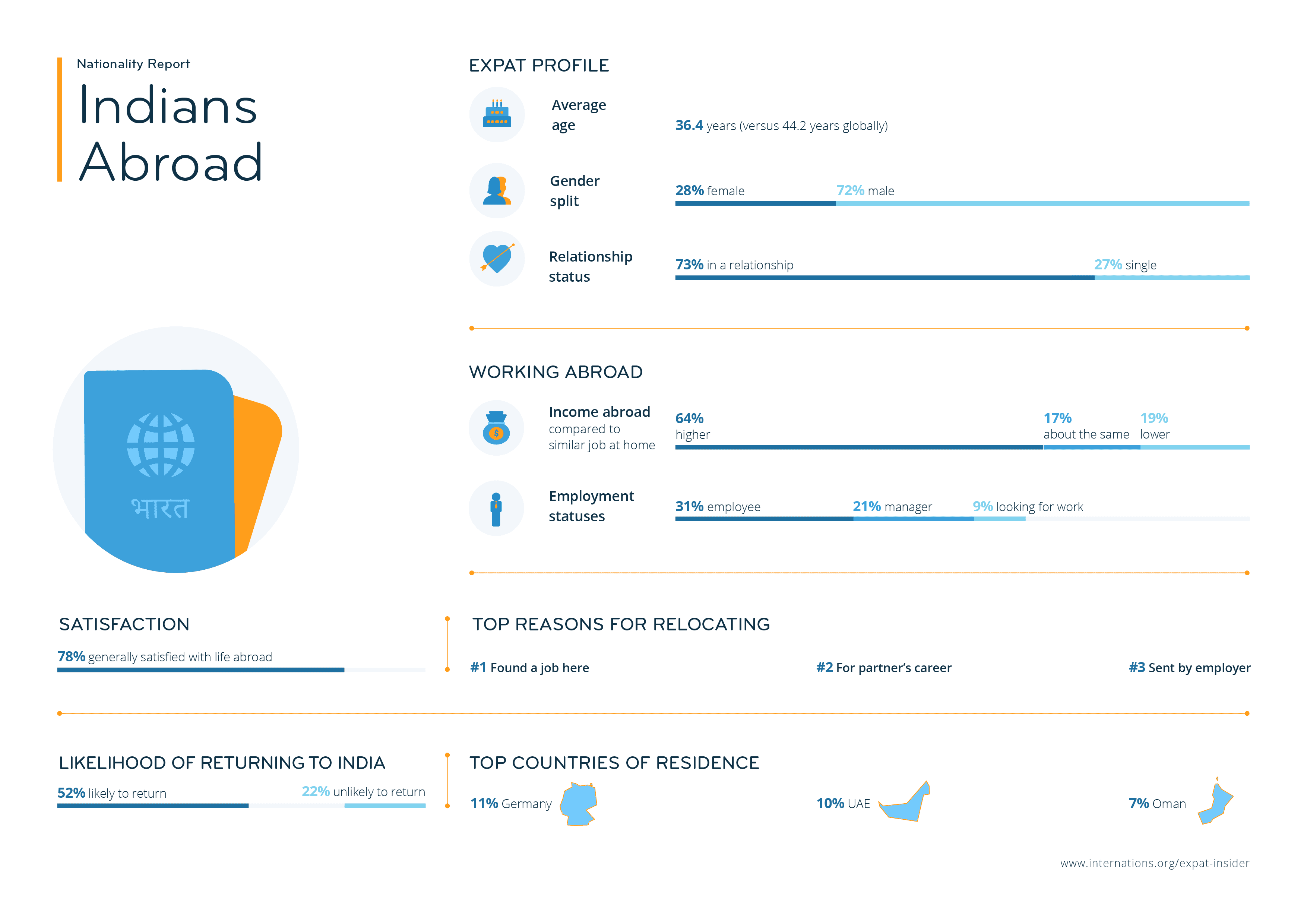Indian Expats: Young Males Moving for Work but Not Long Term
The average Indian expat is nearly a decade younger than the global average, is unlikely to have acquired the host country’s citizenship, and does not plan on staying forever.
- Indians are unlikely to acquire the citizenship of their host country.
- Nevertheless, only 7% do not feel at home and doubt they ever will.
- 93% work full time.
- Of those in a relationship, 84% have an Indian partner.

More Likely Than Average to Return Home
When it comes to how long they have already been living in their host country, expats from India are typically on par with global averages: the only slight difference is that a smaller share of Indians (21% vs. 24% across all nationalities) have been living abroad for more than ten years. The majority of Indian expats (53%) has been living abroad between six months and five years — a percentage similar to the worldwide average (50%).
Nevertheless, many Indians feel at home in their new country: 65% of Indians abroad agree that this is the case for them, and — compared to 15% of all expats — only 7% of Indians say they do not feel at home and don’t think they ever will.
Even more surprising is the percentage of Indians who are first-time expats: more than ten percentage points above the global average of 28%, 39% of Indian respondents have no prior expat experience. Among these first-time expats and also the more experienced ones, the trend seems to be to stay long but not forever. Nearly three in ten (29%) say they plan to stay longer than five years, which is ten percentage points more than the global average (19%). However, only 19% anticipate staying forever (vs. 32% globally).
In fact, 39% of Indian expats say it is very likely that they will return to India, compared to 31% of all respondents who say the same about their country of origin. These hopes of returning home are further emphasized in the mere 4% of Indians who have acquire their host country’s citizenship, compared to 13% of all respondents who’ve undergone naturalization.
Not Worrying about Language the Key to Success?
About half of Indian expats (46%) say they did not really give any thought to language before moving abroad. Likewise, less than 5% say that language learning was a reason for their move abroad, compared to the 11% global average. Their rather carefree approach seems to be more or less successful: 30% agree completely that it is easy to live in their new country without speaking the local language, 13 percentage points above the average. This is a good thing, as 26% report not being able to speak the local language of their host country at all, which is double the survey average of 13%.
However, of those Indian expats who shared that they are not happy with their life abroad, 41% agree that struggling with the language barrier has contributed to this unhappiness, compared to only 25% globally.
No Retirement in Sight for Motivated Indian Expats
A significant share of Indians seek jobs abroad on their own: 17% found a job on their own (vs. 12% of all respondents), next to 13% who were sent by their employer. Once abroad, they are most likely an employee (31% vs. 25% globally), manager (21% vs. 14%), or currently looking for work (9% vs. 8%). A higher-than-average share of Indian expats (7% vs. 5%) are also students (including PhD students). Retirees are, in contrast, few and far between (1% vs. 11%).
Among Indian managers, 68% work in middle management, compared to a global average of 53%. And among the working expats in general, IT and manufacturing & engineering top the list of fields of work at 24% and 12%, respectively — up to twice the survey average of 12% and 8%.
The vast majority of Indian expats (93%) also work full time (vs. 84% globally), though with 44.0 hours a week, they don’t spend more time at their full-time jobs than the survey average. More than three in five working Indian expats (64%) say that their income is higher than what it would be back home.
And lastly, with more than a ten-percentage-point difference to the global average of 41%, 54% of Indian expats hold a postgraduate degree — either a master’s degree or similar — next to 5% with a PhD. One in ten Indians originally even moved abroad to go to school or university (vs. 6% globally).
Long-Distance Relationships Not Uncommon
Out of the 73% of Indian expats in a relationship, 84% say their partner is of the same nationality, and a similar 82% met their partner in India. These values — percentages for partner’s nationality and place of meeting for expats in a relationship — are nearly double the global averages of 43% and 49%, respectively.
Indian expats do not always bring their partner abroad with them, though: 16% of those in a relationship are not currently living in the same country as their partner, compared to 12% of all respondents. But despite the possibility of a long-term relationship, 60% are still completely satisfied with their relationship, versus 52% globally.
Young and Friends with Everyone
The average age of an Indian expat is 36.4 years — nearly a full decade younger than the average respondent (44.2 years). Also unusually far off from the survey average is the gender ratio: 28% of Indian expats are female and 72% male (vs. 51% women and 49% men globally).
And apparently these younger male Indian expats have very few difficulties making friends, both local and international. More than half the Indians abroad (53%) describe their friend group as a fair mix of both expats and locals, though not many Indians have social circles composed solely of local residents (9% vs. 19% globally).
Further Reading
Advertisement
Join InterNations
The community for expats worldwide
Download

